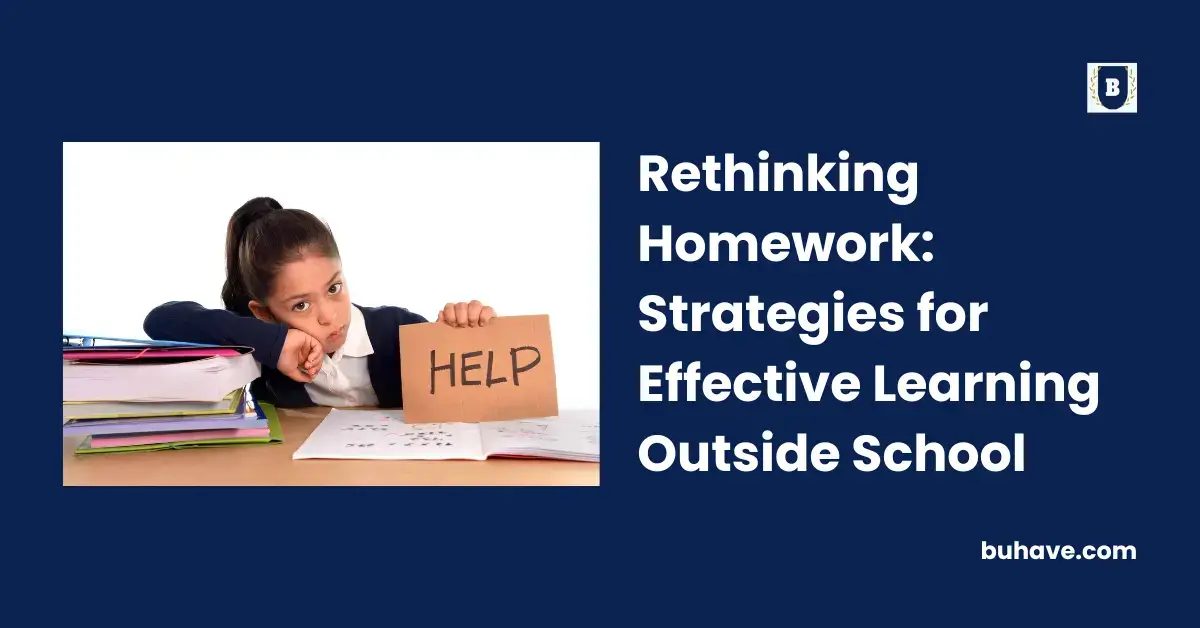Homework has been a longstanding tradition in the world of education. Students across the globe have been handed assignments and tasks to complete outside the classroom for decades. While homework has its place in reinforcing classroom learning, there has been an ongoing debate on its effectiveness, the amount assigned, and its impact on students’ well-being. In recent years, educators and researchers have been reevaluating the role of homework in education. This article delves into the topic of homework, its purpose, and explores innovative strategies for more effective learning outside school.
The Purpose of Homework
Homework serves multiple essential purposes in the educational process. First and foremost, it allows students to practice and apply the knowledge and skills they’ve acquired during classroom instruction. This practice is crucial for reinforcing the material, ensuring better retention, and helping students master the subject matter.
Additionally, homework often prepares students for upcoming lessons by introducing them to new concepts and ideas. This can create a smoother transition during in-class instruction since students already have some familiarity with the topic.
Homework is also a powerful tool for promoting independent learning. It encourages students to take responsibility for their education and develop self-discipline, time management, and research skills. These qualities are invaluable, not only in their academic journey but also in life beyond the classroom.
In essence, homework plays a critical role in the educational process by reinforcing learning, preparing students for upcoming lessons, promoting self-sufficiency, and extending classroom knowledge.
Challenges with Traditional Homework
While homework has its merits, there are also inherent challenges, such as:
- Overload: Excessive homework can lead to students feeling overwhelmed and stressed. Therefore, many choose to buy essays online and to save their time and nerves for other, more important in-class assignments.
- Inequality: Not all students have access to the same resources or support at home, which can result in disparities in the quality and quantity of homework completed.
- Monotony: Repetitive and uninspiring assignments can lead to boredom and disengagement.
- Family Time: Homework can infringe on valuable family and leisure time, potentially leading to strained relationships.
Rethinking Homework: Strategies for Effective Learning
Educators and researchers are exploring alternative approaches to homework, focusing on strategies that enhance the effectiveness of learning outside school while minimizing its negative impact.
Flipped Learning:
Flipped learning reverses the traditional classroom model. Students engage with instructional content at home, such as watching video lectures or reading materials.
In-class time is then reserved for discussions, problem-solving, and interactive activities that help students apply what they learned.
This approach makes homework more purposeful and engaging, as it becomes a preparation for in-depth class discussions.
Project-Based Homework:
Instead of routine assignments, project-based homework tasks students with real-world projects or creative endeavors.
For example, students can be asked to create a science experiment at home, write a short story, or design a solution to a practical problem.
Project-based homework not only enhances learning but also fosters creativity and critical thinking.
Personalized Homework:
Homework assignments tailored to individual student’s needs and interests can be more effective.
Educators can provide students with options for assignments, allowing them to choose topics or tasks that resonate with their passions. In general, personalized homework increases motivation and engagement.
Minimal Homework Policies:
Some educational institutions have adopted minimal homework policies, reducing the overall amount of homework assigned.
These policies prioritize the quality of homework over quantity, aiming to reduce stress and give students more time for self-directed learning and leisure activities.
Homework-Free Weekends:
A variation of minimal homework policies, and homework-free weekends can be implemented to give students a break from assignments.
This strategy allows students to enjoy uninterrupted family time, relaxation, and extracurricular activities.
Collaborative Homework:
Collaborative homework encourages students to work together on assignments. This approach promotes peer learning, cooperation, and the development of social skills.
Digital Learning Platforms:
Digital learning platforms provide students with interactive online resources, quizzes, and games that can be accessed at home.
These platforms offer engaging alternatives to traditional homework assignments.
Impact on Students
Implementing these strategies for effective learning outside school can have a positive impact on students:
Reduced Stress: By reducing the homework load and making assignments more engaging, students experience less stress and burnout.
Enhanced Motivation: Innovative and personalized homework strategies boost students’ motivation to learn and complete assignments.
Improved Academic
Performance: Quality over quantity ensures that homework is an effective learning tool, leading to improved academic performance.
Increased Creativity: Project-based homework stimulates creativity and critical thinking skills.
Balanced Lifestyle: Reducing the amount of homework ensures that students have time for extracurricular activities, hobbies, and relaxation.
The Bottom Line
As educators and researchers continue to rethink homework, there is a growing recognition that learning outside school can be more effective and less burdensome. The implementation of strategies such as flipped learning, project-based homework, personalized assignments, and minimal homework policies can enhance the learning experience and benefit students’ overall well-being. By striking a balance between academic requirements and personal time, the education system can create a more holistic and positive learning environment for students.
– If you are looking for guest posts write for us education now.

